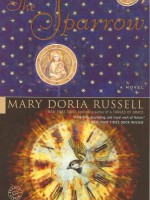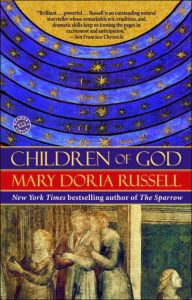 Summary: A group mostly made up of Jesuits discovers that another world with intelligent creatures exists and secretly decides to visit it; tragedy ensues.
Summary: A group mostly made up of Jesuits discovers that another world with intelligent creatures exists and secretly decides to visit it; tragedy ensues.
I previously read The Sparrow about six years ago. In my ongoing reading about Discernment, it was a fiction book that was suggested to me as one that looks at discernment, so I put it back on my list to reread, but a Holy Post discussion about The Sparrow made me decide to pick it up when I did.
As I have been reading various ways to think about Discernment, I keep coming up against the tension between those who see discernment primarily as Christian decision-making, those who see it as a set of tools or a process that includes decision-making, and those who see it primarily as seeking after God. I am definitely in the latter camp. I know these are not mutually exclusive ways to think about discernment, but I do tend to think of them as the three modes where one is prioritized.
I started a book on discernment a couple of weeks ago, and I could not make it through the first chapter because it approached discernment as a tool that was more similar to an incantation to control God or to get God to reveal himself more than a method to help us understand who God is. This problem is part of why I have been reading about discernment, to help figure out where it seems to go wrong. Discernment is often invoked in discussions of spiritual warfare, and people who regularly talk about spiritual warfare seem more likely to believe in various conspiracy theories. The very nature of belief in conspiracy theories makes me distrust your perception of discernment.
 Summary: The second half of the story of The Sparrow.
Summary: The second half of the story of The Sparrow.


 Summary: If you really need a summary, you probably aren’t going to read the review.
Summary: If you really need a summary, you probably aren’t going to read the review.

